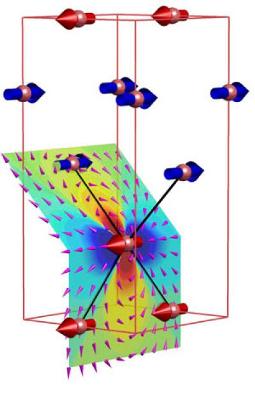An international team of scientists led from the London Centre for Nanotechnology and the Laboratory for Quantum Magnetism in Switzerland has used quantum mechanics to turn on and off the magnetism of a novel material, a transparent salt.
 This image shows the antiferromagnetic arrangement of the spins (colored arrows) in the magnetic salt used by the Swiss-German-US-London team. (credit:University College London)
This image shows the antiferromagnetic arrangement of the spins (colored arrows) in the magnetic salt used by the Swiss-German-US-London team. (credit:University College London)
This work paves the way to use the material as a test bed for the development of future quantum devices. The researchers discovered that the new material did not experience the typical intricacies of other real magnets and leveraged the fact that the interaction of its quantum spins follows the rules of large bar magnets. The study results have been reported in the journal, Science.
According to the researchers, the transparent salt is the ideal substance to study a group of tiny bar magnets at the quantum level. They were able to observe all the spins in the material, discovering that the spins were parallel for pairs of layers, and antiparallel for adjoining layer pairs, just as adjacently placed large bar magnets. The arrangement of the spins is termed as ‘antiferromagnetic,’ quite the opposite to ferromagnets like iron wherein all spins are parallel.
When the material was warmed at a temperature just 0.4°C above the point of absolute zero at which all classical motion gets arrested, the researchers discovered that the spins lost their point and order in arbitrary directions like the way iron loses its ferromagnetism when it is heated to 870°C. Another finding was the same loss of order can be achieved by initiating quantum mechanics in an electromagnet comprising the salt.
This means that the researchers have a cluster of tiny bar magnets that are capable of assuming an antiferromagnetic configuration and they can tune quantum mechanics in this material whenever needed.
Source: http://www.ucl.ac.uk/